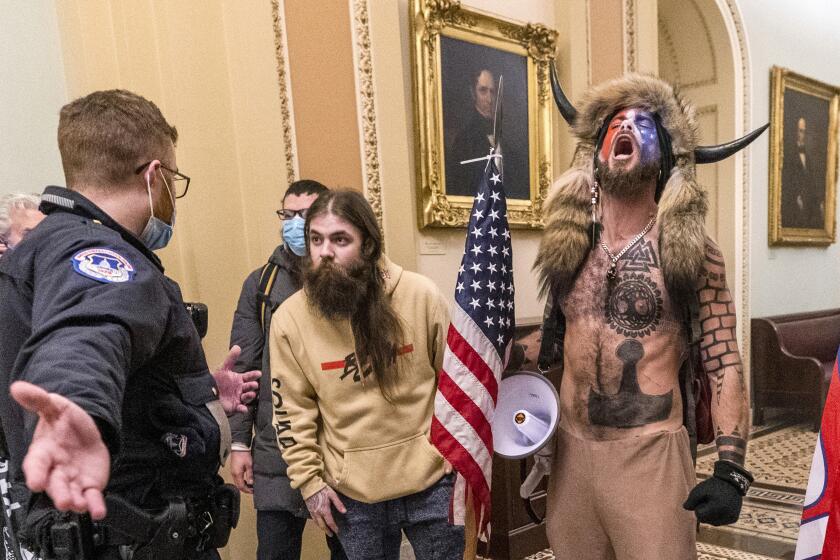Northern Idaho’s anti-government streak hampers COVID-19 fight

- Share via
COEUR D'ALENE, Idaho — Northern Idaho has a long and deep streak of anti-government activism that has confounded attempts to battle a COVID-19 outbreak overwhelming hospitals in the deeply conservative region.
A deadly 1992 standoff with federal agents near the Canadian border helped spark an expansion of radical right-wing groups across the country and the area was for a long time the home of the Aryan Nations, whose leader envisioned a “White Homeland” in the county that is now among the worst hit by the pandemic.
Hospitals in northern Idaho are so packed with COVID-19 patients that authorities announced last week that facilities would be allowed to ration healthcare.
“This is extremism beyond anything I ever witnessed,” Tony Stewart said of people who refused to get vaccinated and wear masks.
Stewart is a founding member of the Kootenai County Task Force on Human Relations, which battled the Aryan Nations for decades and helped bankrupt the neo-Nazi group. “I’m almost speechless in seeing so many people have lost concern for their fellow humans.”
Only 41% of Kootenai County’s 163,000 residents were fully vaccinated, well below the state average of about 56%, officials said.
The House and Senate need to revise their electoral-vote-counting rules, most of which come from an 1887 law called the Electoral Count Act.
Anti-government sentiments are strong in northern Idaho.
State Rep. Heather Scott, a Republican from Blanchard in the northern part of the state, refused an interview request, saying reporters were liars. Scott promoted mask-burning protests around northern Idaho and the rest of the state earlier this year. She is also among the lawmakers who have frequently pushed misinformation about COVID-19 on Facebook.
Stewart called fierce opponents of vaccines an “irrational segment of the population.”
But not everyone agrees there is a problem.
David Hall, 53, who co-owns a restaurant in bustling downtown Coeur d’Alene, said Friday he “serves hundreds of customers a week and I’ve heard of nobody that’s been hospitalized.”
“Not a single person who worked for me got it,” Hall said of COVID-19. “I don’t know where [patients] are coming from.”
One thing Hall does know is news of packed hospitals is bad for business, saying his revenues have dropped.
Don Kress, 65, of Coeur d’Alene, said he believes that Kootenai Health, the town’s major hospital, is overflowing with patients.
“It’s become such a politicized issue,” he said of COVID-19. “If you take the politics out of it and let common sense prevail, people will get the shot.”
Northern Idaho has had an anti-government segment of the population for decades. It was the site of the standoff at Ruby Ridge, north of the town of Sandpoint.
Randy Weaver moved his family to the area in the 1980s to escape what he saw as a corrupt world. Over time, federal agents began investigating the Army veteran for possible ties to white supremacist and anti-government groups. Weaver was eventually suspected of selling a government informant two illegal sawed-off shotguns.
To avoid arrest, Weaver holed up on his land.
On Aug. 21, 1992, a team of U.S. marshals scouting the forest to find suitable places to ambush and arrest Weaver came across his friend, Kevin Harris, and Weaver’s 14-year-old son Samuel in the woods. A gunfight broke out. Samuel Weaver and Deputy U.S. Marshal William Degan were killed.
The next day, an FBI sniper shot and wounded Randy Weaver. As members of the group ran back toward the house, the sniper fired a second bullet, which passed through wife Vicki Weaver’s head — killing her — and wounding Harris in the chest. The family surrendered on Aug. 31, 1992.
The Aryan Nations was not specifically anti-government, but it drew many disaffected people to the area after white supremacist Richard Butler moved there in 1973 from California.
Four years after moving to rural Kootenai County, Butler — a former aeronautical engineer — started a compound. The 20-acre site north of Hayden Lake would become a racist encampment that drew people from across the country. The group held parades in downtown Coeur d’Alene and annual summits at the compound. By the 1990s, the Aryan Nations had one of the first hate websites.
The Aryan Nations compound and its contents were burned and bulldozed after a lawsuit brought by the Southern Poverty Law Center bankrupted the group in 2000.
Now COVID-19 has exacerbated conflicts in Coeur d’Alene, a fast-growing resort and retirement community that hugs the shore of a namesake lake and draws celebrities and the rich to gorgeous lakefront homes. High-rise condos have replaced lumber mills near the lakefront, and swanky stores abound.
Last year, armed groups patrolled the city’s downtown core to protect against non-existent Black Lives Matter protesters.
COVID-19 has thrived in this environment.
Kootenai Health has 200 beds for medical or surgical patients. On Wednesday, Kootenai Health’s doctors and nurses were caring for 218 medical and surgical patients, aided by military doctors and nurses called in to help with the surge.
On Friday, the hospital tallied 101 COVID-19 patients, including 35 requiring critical care. The hospital normally has just 26 intensive care unit beds.
Jeanette Laster is executive director of the Human Rights Education Institute, which was established in the wake of the Aryan Nations’ rise in the region.
She cautioned that it is incorrect to assume that the neo-Nazi philosophy of the Aryans is related to the anti-government sentiments that now dominate the political agenda.
The Aryan Nations was a white supremacist, antisemitic group, she said, while anti-government sentiments are rooted in freedoms guaranteed by the Constitution.
“I don’t feel the majority of our community is hateful,” Laster said. “This is more about constitutional rights.”
Distrust of the media and authorities is also an issue, she said.
“People are begging for accurate information,” Laster said. “There’s a lot of fear.”
More to Read
Sign up for Essential California
The most important California stories and recommendations in your inbox every morning.
You may occasionally receive promotional content from the Los Angeles Times.











